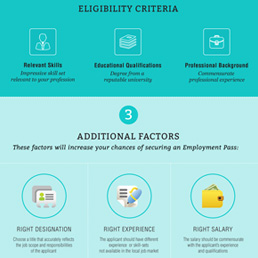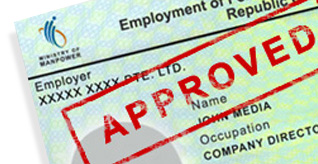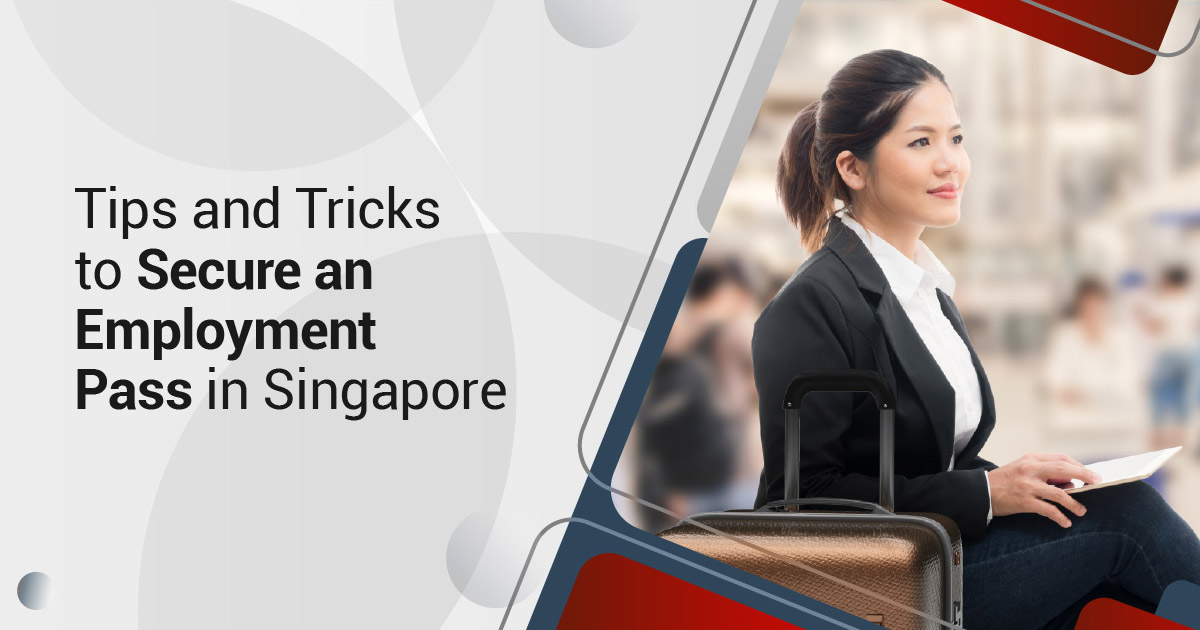Inside This Article:
- A Brief Overview of Singapore’s Foreign Labour Policy
- Applying for a Work Pass – Essential Tips and Tricks
- Matchmaking the Right Candidate with the Right Work Pass
- Reflecting the Candidate’s True Value to the Company
- Relevant Experience
- Educational Qualifications
- Good References
- A Reasonable Salary
- Nationality
- Applicant Currently Working in Singapore
- Company’s Structure
- Commitment
- Niche Industry or Skills in Demand
- Quotas
- Rejections
- Appeals
With its first-world facilities and infrastructure, high levels of safety, pro-business policies and general respect for the rule of law, Singapore has always been one of the top destinations of choice for Singapore multi-national corporations (“MNCs”) and expatriates alike.
Take, for example, Goldman Sachs, a leading global investment banking, securities and investment management firm that slashed US$1 billion in costs by laying off employees across its business operations in the U.S. before embarking on an aggressive hiring spree in Singapore to recruit 1,000 skilled workers in sales and investment banking.
Indeed, as progresses in technology have rendered physical spaces insignificant, MNCs have been increasingly looking towards how they can fully maximise their benefits in the global economy.
A Brief Overview of Singapore’s Foreign Labour Policy
 Generally speaking, Singapore’s Foreign Labour Policy has three main goals:
Generally speaking, Singapore’s Foreign Labour Policy has three main goals:
- To encourage companies to be more productive and depend less on cheap, unskilled foreign labour;
- To promote fair employment practices in the economy and ensure that locals are given fair opportunities; and
- To encourage companies to engage foreign talent with specialist skills that benefit our economy.
In line with these three goals, the Ministry of Manpower (“MOM”) has implemented specific policies to target companies that are merely hiring foreign talent to save costs, as reflected in the table below:
| Work Pass Type | Type of Worker | Applicable Policies |
|---|---|---|
| Work Permit | Domestic workers, confinement nannies, performers, semi-skilled workers in construction, marine, process or services sector |
|
| S Pass | Mid-level employees e.g. technicians |
|
| Employment Pass | Foreign professionals, managers and executives |
|
| EntrePass | Foreign entrepreneurs who wish to start up a business in Singapore |
|
| Personalised Employment Pass | Foreign professionals, managers and executives |
|
| ONE Pass | Global talents in the fields of business, arts & culture, sports, science & technology, and academia & research. |
|
| Tech.Pass | Global tech entrepreneurs, leaders, or tech experts to carry out frontier and disruptive innovations in Singapore. |
|
By raising the minimum salary requirement, MOM intends to ensure that it is more difficult and not as cheap to hire foreign talent, as compared to local employees. In addition, companies will be incentivised to optimise productivity, instead of relying on the employment of cheap foreign labour.
To assist companies in coping with these changes and rising costs of labour, the Singapore government has implemented schemes like the Productivity Solutions Grant (PSG) that provides financial support for business owners to implement IT solutions, equipment, and consultancy services.
Applying for a Work Pass – Essential Tips and Tricks
Matchmaking the Right Candidate with the Right Work Pass

As evident in the previous section, there are various types of work passes available, and MOM’s assessment criteria and emphasis vary accordingly.
For foreign professionals seeking employment in Singapore, the Singapore Employment Pass is a work visa worth considering. This pass is granted to foreign professionals, managers, executives, and skilled workers who have received a job offer in Singapore.
Hence, employers should likewise make a careful analysis and consideration of which pass is the most suitable for the candidate.
Alternatively, for employers who may not have a foreign individual in mind but are considering looking for foreign talent, it may be prudent for the employer to include a list of the relevant documentation required by MOM as part of their own interview or assessment process.
By doing so, employers can potentially cut down on delays when applying for the relevant work pass, as the employer would have all the potential employees’ relevant documentation on hand prior to the application.
Reflecting the Candidate’s True Value to the company
Choosing the appropriate designation for your candidate is also important as it could enhance the chance of approval.
Similar to matchmaking the candidate to the right work pass, the designation of your candidate may also influence how MOM chooses to review the application.
Another important thing to note is that the candidate’s designation could also reflect his or her value to the company. E.g. a “consultant” or “manager” indicates a higher level of seniority and experience, as compared with an “executive” or “assistant”.
Relevant Experience
 The details of the candidate’s unique experience should be set out in such a way that it rationalises why the candidate is chosen for the position and should explain why the candidate is more suitable for the position than a local who has the relevant degree qualifications.
The details of the candidate’s unique experience should be set out in such a way that it rationalises why the candidate is chosen for the position and should explain why the candidate is more suitable for the position than a local who has the relevant degree qualifications.
Ideally, the candidate’s curriculum vitae (“CV”) should also reflect his or her experience in a similar position(s). Particularly for infant industries in Singapore, where there are insufficient locals with the relevant experience, expertise and knowledge, the company can also justify how the candidate could potentially share his or her experience with the company’s local employees.
Educational Qualifications
Note that MOM pays particular attention to a candidate’s qualifications. For example, applicants who hold a diploma or degree certifications from India and China will have to either submit additional documentation in the form of transcripts and marksheets, or get their certifications verified through official channels.
MOM also does not accept certifications in foreign languages, so employers and their applicants should arrange for certifications to be translated by an MOM-certified translator, or an embassy.
Good references
 In instances where the candidate is unable to provide the employer with relevant certifications, the ability to produce references from previous employers or clients will be extremely useful as well.
In instances where the candidate is unable to provide the employer with relevant certifications, the ability to produce references from previous employers or clients will be extremely useful as well.
This is usually applicable to candidates who have built up their career and expertise in relatively “new” industries, such as social media.
A Reasonable Salary
As evidenced by MOM’s policies which have gradually increased minimum salaries for various work passes, employers need to be strategic when deciding the salaries for their candidates as well.
Given that the minimum salary has been raised across the bar, this does not mean that employers should opt to give their employees the bare minimum. Rather, it would be prudent to peg the employee’s salary somewhere above the minimum salary stipulated by MOM. The minimum salary requirement for the Employment Pass will rise to S$5,600 from 1 January 2025, and to S$6,200 for roles in the financial services sector.
Nationality
While Singapore is generally an open economy and conducts international business relations with many countries across the world, due to socio-political reasons, there are certain countries that Singapore may be less inclined towards.
 Examples of such countries would include those listed on the Immigration and Checkpoints Authority’s (“ICA”) list of level two countries, as well as high-risk and non-cooperative jurisdictions identified by the Financial Action Task Force (“FATF”), which Singapore is a member country of.
Examples of such countries would include those listed on the Immigration and Checkpoints Authority’s (“ICA”) list of level two countries, as well as high-risk and non-cooperative jurisdictions identified by the Financial Action Task Force (“FATF”), which Singapore is a member country of.
Similarly, citizens from identified “low-risk” countries such as Malaysia, Australia, and the United States find that approval is more easily obtained.
Applicant Currently Working in Singapore
In general, applicants who currently work in Singapore would find it easier to get their applications approved, especially if there are no complaints specific to the applicant’s time in Singapore.
Company’s Structure
MOM does review the company’s structure, as well as its assets and liquidity when, assessing whether the company has the capability and capacity to pay its employees. Hence, companies that have been operating for at least three years and have accounts that reflect positive revenue; will have an advantage over startups.
However, new companies can evidence their capability by showing bank statements or a letter of undertaking from a reputable parent company (if it is a wholly-owned subsidiary) that its operations will be financed until it is self-sufficient.
Commitment
It is also essential that the company indicates its commitment towards contributing to Singapore’s economy. Examples of how the company can do so include:
- Bank statements indicating capital injections
- Provision of company’s business profile
- Signed contracts with large clients
- Letter of intent to rent office premises or rental agreement
Niche Industry or Skills in Demand
 Companies in a niche industry will find that they have an advantage in hiring foreign talent as there will most probably be fewer locals who have the relevant skills, qualifications and experience to meet their needs.
Companies in a niche industry will find that they have an advantage in hiring foreign talent as there will most probably be fewer locals who have the relevant skills, qualifications and experience to meet their needs.
Likewise, there are certain occupations where there is a shortage of local expertise. Examples of such occupations would include Project Accountants, Quantity Surveyors and IT Technology Risk Engineers. MOM has a comprehensive list of skills in demand that potential candidates and employers can look at.
Quotas
While this is applicable specifically to S Pass and Work Permit holders, MOM’s implementation of the quota policy also reflects that MOM is mindful of the proportion of foreign workers vis-à-vis its local employees within the company. Hence, while there are no explicit quotas for other classes of work passes, it would be prudent for employers to be mindful of how many local employers they have on their payroll.
Rejections
Typically, candidates who have been rejected before will find it more difficult during their re-application process, particularly if MOM has requested for additional documents to be furnished, but the candidate or employer was unable to do so at this point in time.
In such situations, it may be more practical for the candidate and employer to appeal against MOM’s decision.
Appeals
 Subsequent to MOM’s rejection, the candidate and employer will have 30 days to lodge an appeal, which takes approximately 6 weeks for MOM to process. Given MOM’s tightened labour policy, companies will have to anticipate that rejections are becoming more and more common. Before making an appeal, consult InCorp to gather all the relevant documentation to substantiate your case.
Subsequent to MOM’s rejection, the candidate and employer will have 30 days to lodge an appeal, which takes approximately 6 weeks for MOM to process. Given MOM’s tightened labour policy, companies will have to anticipate that rejections are becoming more and more common. Before making an appeal, consult InCorp to gather all the relevant documentation to substantiate your case.
FAQs About Securing Employment Pass in Singapore
How can I get an employment pass in Singapore?
- You can engage InCorp’s reliable EP services to get employment passes for your foreign employees in Singapore.
What is the difference between EP and S Pass?
- An S Pass is designed for mid-level skilled PMETs with relevant qualifications and work experience. On the other hand, an EP is for skilled professionals with substantial educational qualifications and work experience, amidst other requirements.
Is it difficult to get employment pass in Singapore?
- Although the Singapore government has gradually tightened employment pass requirements, we at InCorp are confident in helping you secure passes for your staff.


